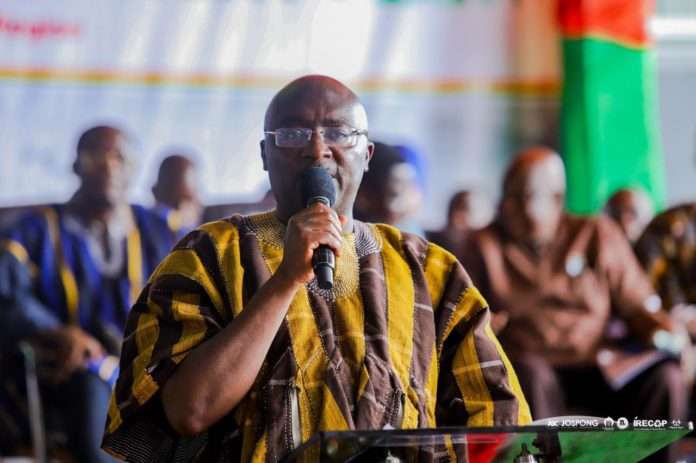Professor Michael Ayamga-Adongo, a Development Economist and Senior Lecturer at the University for Development Studies, has strongly criticized the ruling New Patriotic Party flagbearer’s proposal to introduce a credit-scoring system when elected as President.
Describing it as an “economic scam”, Prof. Ayaamga-Adongo argued that the proposal will deepen financial exclusion for millions of unemployed youth and struggling entrepreneurs.
According to him, the government’s approach is not grounded in the economic realities of Ghana, accusing policymakers of misunderstanding the fundamental drivers of a successful credit system.
“To have a good credit score you need a means of repayment (job). The jobs cost over GHS 35000. I guess you need 35000 for starters. Yet, in this country, finding a job often costs upwards of GHS 35,000. That’s just for starters.”
Professor Michael Ayamga-Adongo, Development Economist and Senior Lecturer at University for Development Studies
Excluding the Financially Vulnerable
Professor Ayamga-Adongo, further pointed out that the introduction of such a system will only serve to exclude the most vulnerable from financial participation, particularly young people and entrepreneurs who are already struggling to access credit.
He argued that without the ability to generate steady income or build profitable businesses, millions will find it impossible to meet the requirements for a favourable credit score.
“How can we expect unemployed individuals or failing small business owners to build good credit scores when they can’t even cover basic expenses, let alone repay loans?”
Professor Michael Ayamga-Adongo, Development Economist and Senior Lecturer at University for Development Studies
The Development economist firmly opined that this initiative seems disconnected from the underlying issues facing the country’s economy. “Bawumia reads, but the problem is he does not analyze,” he added, taking a direct swipe at the Vice President’s handling of economic policy.
Criticism of Government Intervention in Financial Markets
Professor Ayamga-Adongo also raised concerns about the role of government in dictating how financial institutions manage credit risk.
He highlighted that the success of a credit system is typically determined by the overall economic environment rather than government directives.
“It is not the place for the government to tell financial institutions how they should administer credit and manage their risks. The economic environment is what dictates these decisions.”
Professor Michael Ayamga-Adongo, Development Economist and Senior Lecturer at University for Development Studies
He cited the example of MTN’s credit-scoring system for its popular quick loan scheme, which operates without government interference.
“MTN is running a credit-scoring quick loan scheme. The government didn’t tell it to do so,” he remarked, stressing that private-sector initiatives succeed when the economic environment is conducive, not when it is subject to political mandates.
Lack of Transparency and Financial Risk
In his analysis, Professor Ayamga-Adongo questioned the transparency of the Vice President’s plans, particularly regarding the financial backing for this ambitious credit system, adding “The government has not disclosed how many billions of dollars it is giving to banks to engage in this Google-like experiment”.
He warned that banks would not risk their depositors’ and investors’ funds on unsecured loans unless there was clear backing from the government – a situation he believes is both financially unsound and deceptive.

He described the entire proposal as “a complete deception,” accusing the government of engaging in a risky gamble that could destabilize financial institutions further.
“The banks are not going to use their depositor’s and investor’s money for unsecured experiments. This is why we know this is a complete deception.”
Professor Michael Ayamga-Adongo, Development Economist and Senior Lecturer at University for Development Studies
Interest Rates and Economic Instability
Professor Ayamga-Adongo highlighted the broader macroeconomic challenges facing the country and pointed to soaring interest rates that he attributes to the government’s extensive domestic borrowing.
“Interest rates are through the roof because this government is actively engaged in domestic borrowing,” he said. According to him, the rising cost of borrowing further cripples businesses and individual borrowers, exacerbating financial exclusion and leading to a cycle of unrepayable debts.
He also linked the current business environment to the collapse of many small and medium-sized enterprises (SMEs), with many individuals defaulting on quick loans.
“People are changing their phone numbers because they can’t pay back small quick loans,” he stated, painting a grim picture of Ghana’s financial landscape.
For him, a robust economy must precede any serious talk about building a credit system. “Fix the economy first, then the banks will naturally fix the credit system“, he urged.
Professor Ayamga-Adongo’s critique of the proposed credit scoring system suggests a fundamental misunderstanding by policymakers of how credit systems develop.
He pointed out that in countries where credit scoring systems function successfully, they evolved organically within the financial sector, not by government decree.
“In countries where the credit scoring system works, it evolved through the financial system itself, not through political mandates,” he said. He suggested that any attempt by the government to impose such a system would not only be ineffective but also counterproductive.
In a final jab, Professor Ayamga-Adongo dismissed the proposal as a poorly conceived political stunt. “Is the government going to issue a fiat directing financial institutions to use credit scoring? It can’t. Go tell this to the Marines because the sailors are too informed for these stunts”.
For him, the real solution lies in stabilizing the economy, not in government attempts to dictate how financial institutions should operate, asserting that “Bawumia should fix the economy, and the banks will fix the credit.”
READ ALSO: Stonebwoy Unveils New Album ‘Up & Running’ at Listening Party



















